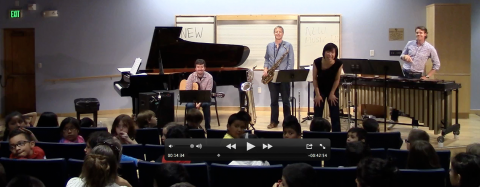When we talk about the music of composers such as Mozart, Beethoven, or Brahms, or of the Beatles or Scott Joplin, we often talk about triads, 3-note chords stacked in thirds. Did you know that in the history of music, the idea of a triad is relatively new? The term dates from the early 17th century, when a music theorist and theologian named Johannes Lippius applied the idea of the trinity to describing a musical unit, a trias harmonica.
Three instances of a G-major triad:
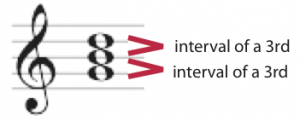
G-major triad (listen)
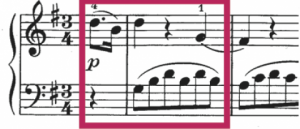
Mozart Sonata in G Major (listen)
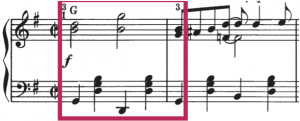
Joplin Rag (listen)
Happenings: Serving Community
In this issue we focus on a few ways in which our music theory department serves different communities.
Daphne Leong, with her quartet Throw Down or Shut Up!, hosted a hundred third- and fourth-graders for an interactive concert “New Music: What’s New? What’s Cool?” The children learned about new music, composers, and cool things like canon, phasing, and form in music by Andriessen, Reich, Shende, and Gunther.
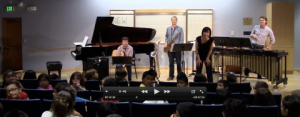
The week before Halloween, Philip Chang delivered a pre-concert talk about horror author H.P. Lovecraft, his impact on popular culture, and what he thought about classical music. The occasion? The Boulder Laptop Orchestra’s (BLOrk) live accompaniment to the silent film The Call of Cthulhu.
Yonatan Malin is completing almost four years as editor of Music Theory Online (MTO), a peer-reviewed journal of the Society for Music Theory. With the December 2014 issue, he will have been editor for 14 issues with a total of 85 articles, 22 essays, and 5 conference reports. MTO is an open access journal with international readership, and the most public face of new research in music theory. It publishes in all areas of music theory. Integrated sound files, video, and animation bring its articles to life.
Recent articles of interest include “Hollywood Cadences: The Music and Structure of Cinematic Expectation” by Frank Lehman (link), “Timing and Meter in Mande Drumming from Mali” by Rainer Polak and Justin London (link), “Other Good Bridges: Continuity and Debussy’s ‘Reflets dans l’eau’” by our colleague Keith Waters (link), and an award winning article, “Grouping Hierarchy and Trajectories of Pacing in Performances of Chopin’s Mazurkas” by our former student Mitchell Ohriner (link).
In February Keith Waters will be guest jazz artist for the Elon University Jazz Festival. In March he will provide a series of lectures on jazz and popular music at Graz University for Arts and Music, Austria. Waters’ book The Studio Recordings of the Miles Davis Quintet, 1965-68 (Oxford University Press, 2011) received no fewer than five awards by organizations as diverse as the Society for Music Theory, the Association of Recorded Sound Collections (for Excellence in Historical Recorded Sound Research), Down Beat Editor’s Pick, and the Jazz Journalists Association. This is a book read by academics, jazz musicians, and jazz teachers!
Kris Shaffer created the College of Music’s first hybrid course, cross-listed with computer science: Harmony and Form in Pop/Rock Music: A Computational Approach. The course involved students from undergraduate to doctoral levels from music and computer science in a collaborative project building on recent work in the field of computational musicology. Student results are published online. Kris also released Open Music Theory, a free, online, interactive textbook for undergraduate music theory.
Steven Bruns has created a large repository of digital versions of manuscripts, scores, letters, and other documents of the American composer George Crumb. Bruns frequently serves as a resource for those doing research on this renowned composer.
In March the department will host Nancy Rogers (Florida State University), an expert on music-theory pedagogy. We are sponsoring a workshop for area high-school theory teachers*, in which Dr. Rogers will speak on the use of harmonic and melodic patterns for fluent composition. We thank Bill Elliott for his generous support, which makes this workshop possible.
* The workshop will be held on Tuesday, March 10, 7-9 pm, in room C125 in the Imig Music Building. It is open to all interested.
UPCOMING EVENTS
“The Public Intellectual: Maintaining an Online Scholarly Presence”
Kris Shaffer
March 2, 2015, 2pm
Imig Music Bldg., C199
